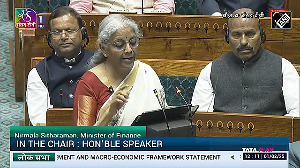Implications for capital gains, wealth taxes, and investment strategies require careful consideration, notes Anil Rego, founder and CEO, RightHorizons.

India's tax system is set for a major overhaul with the introduction of the Direct Tax Code (DTC) 2025, which will replace the decades-old Income Tax Act of 1961.
In her Union Budget 2025-2026 speech, Finance Minister Nirmala Sitharaman said that the new income tax bill -- a direct tax code aimed at simplifying compliance for individual taxpayers -- will be introduced in the Lok Sabha next week.
For investors, this new code represents both opportunities and challenges. The DTC 2025 aims to simplify tax laws, broaden the tax base, and align India's tax framework with global standards.
However, its implications for capital gains, wealth taxes, and investment strategies require careful consideration.
Background and Objectives
The Direct Tax Code 2025 is a long-awaited reform designed to modernise India's tax system. The Income Tax Act of 1961, despite numerous amendments, had become overly complex, leading to confusion and frequent litigation. The DTC seeks to address these issues by:
1. Simplifying Tax Laws: Reducing the number of exemptions and deductions to make compliance easier.
2. Broadening the Tax Base: Encouraging more individuals and businesses to pay taxes by minimising loopholes.
3. Enhancing Transparency: Introducing clearer guidelines to reduce disputes and improve voluntary compliance.
For investors, these changes mean a more predictable tax environment, but they also require a reevaluation of existing investment strategies to optimise returns and minimise liabilities.
Key Features of the Direct Tax Code 2025
The DTC introduces several changes that will directly impact investors:
1. Simplified Tax Slabs and Rates
The DTC proposes revised income tax slabs, with lower rates for middle-income earners and progressive rates for high-income individuals.
For example, incomes up to Rs 5 lakh may be taxed at 10%, while incomes above Rs 10 lakh could face a 30% tax rate.
2. Residence-Based Taxation
- The DTC shifts from source-based to residence-based taxation, meaning Indian residents will be taxed on their global income. This change aligns India's tax framework with international practices but may increase tax liabilities for investors with overseas earnings.
3. Capital Gains Taxation
- Capital gains will no longer be treated as a separate category but will be integrated into regular income. This could result in higher tax liabilities for investors with significant gains from stocks, real estate, or other assets.
4. Wealth and Inheritance Taxes
- The DTC may reintroduce wealth or inheritance taxes, targeting high-net-worth individuals. This could impact long-term estate planning and intergenerational wealth transfer strategies.
5. Expanded Tax Audit Roles
- Company Secretaries and Cost and Management Accountants will now be allowed to conduct tax audits, which could lead to more efficient and diverse audit processes.
Implications for Investors
The DTC 2025 presents both opportunities and challenges for investors:
1. Tax-Efficient Investment Strategies
- With the reduction of exemptions and deductions, investors will need to focus on tax-efficient instruments such as equity-linked savings schemes (ELSS), National Pension System (NPS), and tax-free bonds.
2. Re-evaluation of Capital Gains
The integration of capital gains into regular income may prompt investors to reconsider their portfolios. Long-term investments in equity or real estate may become less attractive due to higher tax liabilities.
3. Estate and Succession Planning
The potential reintroduction of wealth and inheritance taxes underscores the importance of robust estate planning. Investors may need to explore tools like trusts, family limited partnerships, and gifting strategies to protect their wealth.
4. Global Income Reporting
Residence-based taxation means investors with overseas income will need to ensure accurate reporting and compliance with Indian tax laws. This may require professional assistance to avoid double taxation or penalties.
5. Digital Compliance
The DTC's emphasis on digitalisation and transparency will require investors to adopt advanced tools for compliance and reporting. Real-time tax tracking and audit readiness will become essential.
Challenges and Considerations
While the DTC 2025 promises significant benefits, its implementation may pose challenges for investors:
1. Transition Complexities: Adapting to new rules and definitions may require significant re-education and adjustments to existing financial plans.
2. Increased Tax Liabilities: The removal of exemptions and the integration of capital gains into regular income could increase tax burdens for certain investors.
3. Market Volatility: Changes in tax policies may lead to short-term market volatility as investors adjust their portfolios.
Conclusion
The Direct Tax Code 2025 represents a bold step towards modernising India's tax system.
For investors, it offers an opportunity to rethink strategies and optimise returns in a more transparent and predictable tax environment. However, the changes also require careful planning and proactive adjustments to mitigate potential liabilities.
As the DTC rolls out in April 2025, its success will depend on effective implementation and stakeholder collaboration.
For now, investors must focus on understanding the nuances of the new code and working with financial advisors to align their portfolios with the evolving tax landscape.











 © 2025
© 2025